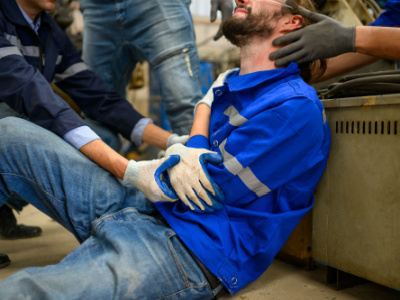5 Common Types of Workplace Injuries
 Accidents can happen anywhere, and the workplace is no exception. Every day, workers in various industries are injured on the job due to a variety of reasons. These injuries can range from minor cuts and bruises to more serious conditions that require extensive medical treatment. If you have been injured at work, it is important to understand your options for receiving workers' compensation benefits. An experienced attorney can provide representation when filing claims related to work injuries, ensuring that you will be able to receive the benefits you deserve.
Accidents can happen anywhere, and the workplace is no exception. Every day, workers in various industries are injured on the job due to a variety of reasons. These injuries can range from minor cuts and bruises to more serious conditions that require extensive medical treatment. If you have been injured at work, it is important to understand your options for receiving workers' compensation benefits. An experienced attorney can provide representation when filing claims related to work injuries, ensuring that you will be able to receive the benefits you deserve.
Some injuries that commonly occur in workplaces in Illinois include:
1. Slips, Trips, and Falls
Slippery floors, cluttered walkways, or uneven surfaces can lead to slips-and-fall or trip-and-fall accidents. During the winter, the risks of these types of accidents can increase due to snow, ice, wet floors, and other issues that lead to slippery walking surfaces. These accidents can cause sprains, fractures, head injuries, or spinal cord damage. Employers have a responsibility to maintain a safe working environment by promptly addressing any hazards that could contribute to these incidents.
2. Strains and Sprains
Lifting heavy objects improperly or performing repetitive motions can result in strains and sprains in muscles or joints. Commonly affected areas include the back, neck, shoulders, wrists, knees, and ankles. These injuries often require medical treatment such as physical therapy or surgery depending on their severity. If these injuries were related to the work a person performed, they will usually qualify for workers’ compensation benefits.
3. Occupational Illnesses
Certain occupations expose employees to hazardous substances that may lead to long-term illnesses over time. Workers exposed to asbestos, mold, fumes, chemicals, radiation, dust containing fine particles, and other toxins may develop respiratory problems, and they may be at risk of forms of cancer such as mesothelioma. In some cases, the symptoms of occupational diseases may not become apparent until years after exposure occurs.
4. Machinery Accidents
Employees who work with heavy machinery or equipment are at risk of being involved in accidents that can result in severe injuries. A malfunctioning machine, improper training, lack of safety guards, or failure to follow proper procedures can all contribute to these incidents. Common machinery-related injuries include crush injuries, amputations, and traumatic brain injuries.
5. Vehicle Accidents
Workers who operate vehicles as part of their jobs may be at risk of being injured in collisions. Those who work in industries such as transportation and delivery services are more likely to suffer these types of injuries. Workers injured in a motor vehicle accident while performing work duties are generally eligible for workers’ compensation benefits.
Qualifying for Workers' Compensation Benefits
If you have been injured in a workplace accident, you will generally be able to receive workers' compensation benefits, which may cover the costs of medical treatment and provide you with payments to address the loss of income due to a temporary or permanent disability. To be eligible, some key requirements must typically be met:
-
Evidence of employment: You must demonstrate that you were employed at the time the injury occurred. Businesses are required to carry workers' compensation insurance, which provides coverage for employees who are injured on the job.
-
Work-related Injury: The injury must have occurred during the course of your employment, or it must be related to your work duties. If your employer disputes whether your injury was related to work activities, you may need to provide additional documentation and evidence to support your claim.
-
Timely reporting: You must report an accident or injury promptly to your employer. In general, work-related injuries must be reported no more than 45 days after an accident occurred or an injury was discovered.
-
Medical evaluation: An examination by a qualified medical professional is crucial in establishing the relationship between your injury and a workplace accident or the work activities you have performed. It also helps determine the extent of your injuries and the need for any ongoing treatment or future medical care.
-
Compensation claim filing: You may need to submit a formal claim to ensure that you will be able to receive the proper workers’ compensation benefits. Failure to comply with your legal requirements within applicable timelines could result in denial of benefits.
Contact a Plainfield Workers' Compensation Attorney
Worker's compensation laws can be complex, and navigating the claims process on your own can be overwhelming. To ensure you receive the full range of benefits available and that your rights are protected, you can consult with an experienced Will County workers’ compensation lawyer. At Flaherty Law, LLC, our knowledgeable attorney can guide you through the process of filing a claim, help you gather necessary evidence, and address any issues that may affect your ability to receive the proper benefits. Contact us today at 815-577-7500 to schedule a free consultation and learn how we can help with your claim.






